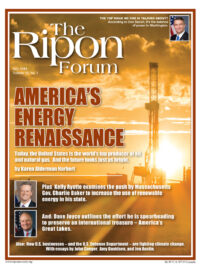
What do McDonald’s, Procter & Gamble, and Walmart have in common? As well as being some of the world’s best-known American brands, they are also among the world’s leading companies driving ambitious action on climate change. Like many of their peers, they recognize that incorporating climate action into their corporate strategies represents one of this century’s most significant business opportunities. Hundreds of companies worldwide are making it clear that they see the transition to the low-carbon economy as a driver of innovation, competitiveness, risk management, and growth.
As part of the We Mean Business coalition’s Take Action campaign, more than 700 leading businesses around the world are taking bold climate action. These companies are headquartered in more than 47 countries and have a collective market capitalization of over $16.7 trillion, representing more than 20% of the entire global economy.
Companies are increasingly seeing that the risks of not acting on climate change are a real threat to their business.
Of these, more than 400 companies have committed to setting science-based emissions reduction targets to ensure they are reducing their greenhouse gas emissions in line with the Paris Agreement. Over 800 more have indicated that they plan to do so before 2020. Many of these companies are headquartered in the United States, including Dell, General Mills, Stanley Black & Decker, Best Buy and Levi Strauss.
Companies are increasingly seeing that the risks of not acting on climate change are a real threat to their business – from stranded assets to increased disruptions in their supply chains and operations from extreme weather. They are also finding that the cost savings from climate action are often significant. Take Walmart, the world’s largest company by revenue, which saved nearly $1 billion in a single year, thanks to the actions taken toward meeting its science-based target. Similarly, energy productivity improvements at Wisconsin-based Johnson Controls have contributed to both a 41% reduction in the company’s greenhouse gas emissions intensity and over $100 million in annual energy savings.
As the cost of wind and solar continues to drop, companies are also driving demand for renewable energy and saving significantly on energy bills. Over 130 companies have committed to go 100% renewable, as part of the RE100 initiative. American companies like Nike, T-Mobile, Visa, Kellogg’s, and Johnson and Johnson are all members. Together, RE100 companies are now creating annual demand for renewable electricity equivalent to that needed to power all of New York State.
What’s more, a growing number of these companies are reaching their targets ahead of schedule. Apple and Google are now both powered by 100% renewables, having just joined the initiative in 2016. As part of its global commitment, Budweiser is working with Thunder Ranch Wind Farm in Oklahoma to meet its electricity needs for brewing in the U.S.
There are now more American jobs in solar energy than either oil and gas extraction or coal mining, as the portion of renewable energy in the U.S. energy mix grows: renewables now account for 18% of U.S. energy generation. In Texas, the wind energy industry alone employs over 24,000 people, more than any other state.
There are now more American jobs in solar energy than either oil and gas extraction or coal mining.
As more businesses seek to reduce greenhouse gas emissions and invest in renewable energy, supportive policies are helping attract the growing number of companies that have made these commitments. Many companies are successfully advocating for strong climate and clean energy policies in states and cities throughout the U.S. Last year in Nevada, action by investors and companies helped to get an increase in the state’s renewable portfolio standard – a regulation that requires the increased production of energy from renewable energy sources – to 40% through the state legislature. In North Carolina, companies helped to advance bipartisan clean energy legislation to create a new utility green tariff program for corporate buyers, allow corporate leasing of renewables, and add new solar energy to the grid.
In tandem with corporate climate action, cities, states and other non-federal leaders are also scaling up climate action. In just one year, the We Are Still In coalition has become a national movement of more than 2,800 businesses, investors, cities, and other leaders who are committed to ensuring that the U.S. remains a global leader on climate change. Together, the signatories represent 160.2 million Americans and more than $6.2 trillion of the American economy.
Through their actions to tackle climate change, American companies are making an astute business move. Smart policies are helping businesses – and the country – to capitalize on and capture the benefits of the transition to a low-carbon economy. Through shared ambition and collaboration on climate action, policy makers and American companies can unlock the economy’s potential. Corporate action on climate shows it’s too great an opportunity to miss.
Jen Austin is the policy director at We Mean Business, a global nonprofit coalition working with businesses to take action on climate change.




